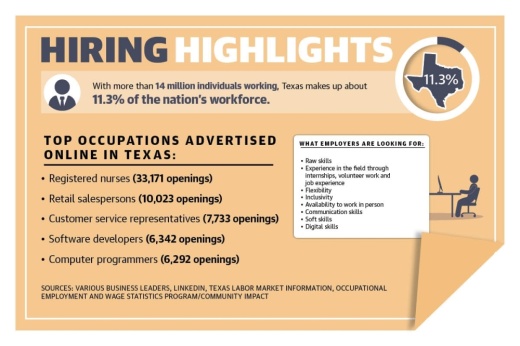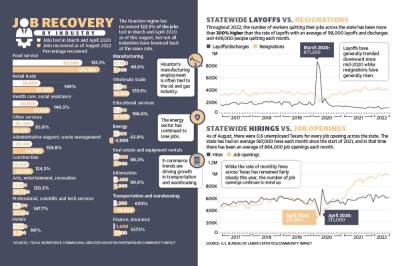“Restaurants and bars [have] got roughly 60,000 more jobs than they had prior to the pandemic, and they would have even more if they could find workers. I mean, you can almost say that about any sector—that employment growth would be stronger if we could find the workers,” said Patrick Jankowski, senior vice president of research for the GHP, during a Sept. 9 Houston Northwest Chamber Economic Outlook Forum.
Many Cy-Fair businesses have faced hurdles in hiring as managers seek to fill positions with seemingly few prospective employees. According to the U.S. Bureau of Labor Statistics, there were 0.6 unemployed Texans for every job opening across the state in August, compared to 0.9 in early 2020.
Officials with the local business community told Community Impact that competition within their industries has contributed to their hiring struggles as well as many workers changing careers during the pandemic.
“I would say 75%-80% of the staff that are in our communities have young children at home, and a lot of them found that they could work remotely and still be at home with their kids,” said Aria Asgar, the culture and training coordinator for Village Green Assisted Living and Memory Care in Cypress. “At the time, our salary was much lower, so we did have to increase [wages] to kind of get with the times with inflation.”
While most sectors hit hardest in the pandemic have regained the jobs lost and continue to grow in Houston, the energy, manufacturing, hotels, information and real estate industries had not yet reached prepandemic staffing levels as of August, according to BLS data. Based on the most recent data available from the Texas Workforce Commission, the Greater Houston area added 5,400 jobs in August. According to Jankowski, the region typically creates 7,000-10,000 jobs in a “normal” August and between 10,000-18,000 in a “boom year.”
Jankowski reported it is too early to tell whether the slower growth in August is the start of a longer trend. However, he said he believes Houston is better positioned than other metros, such as Los Angeles and New York City, to overcome an economic downturn.
“There’s a lot of talk of the U.S. going into a recession—some think we are in a recession,” Jankowski said. “If we do and Houston suffers, we’re much better off to ride out the recession than any of those other major cities that haven’t recovered yet because we’re ahead on jobs recovered.”
Staffing challenges
Dario Herrera oversees marketing, among other operations, for Grupo Herrera Restaurants, which has about 300 employees across its seven restaurants, including Alicia’s Mexican Grille, Galiana’s Tex Mex & Agave Bar, Marvino’s Italian Steakhouse and Dario’s Steakhouse & Seafood in Cypress. After about two years of struggling to find and keep employees, Herrera said staffing levels have started to pick up again. He said while the restaurant group could use a few more wait staff, kitchen staff and hosts, several locations were fully staffed as of October.
“This year, 2022, things do feel like they have kind of gotten back to normal. There are more people coming out to look for jobs,” he said. “Last year and 2020, we did have a big turnover rate where we’d have a lot of people coming in probably having never worked in a restaurant before, and they were just looking for a job, ... and they would maybe last a week or two weeks tops, and they just wouldn’t come back.”
The education sector has also seen increased turnover throughout the pandemic. Sally Magnuson, district director of communications and marketing for Harmony Public Schools in North Houston, said the charter school system and local independent school districts saw teachers leave the profession amid uncertainty and a transition to virtual learning. Those who were able to work from home preferred to stay there as opposed to returning to a traditional workplace setting, she said.
“Many teachers retired from the profession, and others changed professions during that pandemic time,” Magnuson said.
This sentiment was echoed by service-based industry leaders in the Cy-Fair area who noted how their businesses provided little opportunity for remote work, which has cost them employees. At Village Green Assisted Living and Memory Care, for instance, officials adapted to a smaller hiring pool during the pandemic by reducing experience requirements and hiring those who had just graduated.
“It was really hard to retain staff, but it also filtered out the people that were there for the wrong reason and kind of brought us people that were there for the right one,” Asgar said. “So I think everything—though it was brutal—happens for a reason.”
Changes in the workplace
Cy-Fair Federal Credit Union, which has multiple locations in the community, has adapted to better recruit and retain employees during the pandemic, President and CEO Cameron Dickey said. The business transitioned to more technology-based processes that allow customers to still interact with staff while maintaining a safe distance.
This shift led to the need for more employees for services such as curbside deposits and mobile deposits via phone calls. More remote positions were created in the past couple of years to appeal to those preferring to work from home, and Dickey said the credit union also started holding special events for staff and recognizing outstanding employees.
“We have an annual appreciation dinner and casino nights,” he said. “We have been active in community events, but some of them now were for making sure we form teams when there are volleyball [or] softball events—doing things where we have more opportunity for camaraderie and team building along the way that we’re doing it.”
As times have changed, local businesses have adapted to ensure they kept staffing levels steady enough to keep their doors open. For some, this meant making changes and hiring those with less experience than previously demanded, and for others, it meant taking a more aggressive approach with the existing pool of prospective employees.
Cy-Fair Federal Credit Union held its first-ever job fair, and Harmony Public Schools visited college campuses to connect with upcoming graduates who may be interested in working there.
Local business leaders said they have implemented pay raises during the pandemic in an effort to boost recruitment and retention efforts. Dickey said he expects to see continued pressure on employers to offer competitive compensation as well as keep up with cost of living increases.
“We had sort of a spike in folks coming to us with job offers from other locations, oftentimes set at higher salary increases than we had seen in the past, and we’ve always tried to be an above-market-compensation philosophy organization,” Dickey said.
As Cy-Fair business leaders look ahead and prepare for the next year, they said they are hopeful that hiring will become easier and more applicants will make themselves available soon. “I think my hope is that staffing will be much easier next year now that COVID[-19] has kind of calmed a bit,” Magnuson said. “Maybe there might be a possibility that some of the teachers who stepped away for a year to kind of catch their breath may want to come back and realize, ‘OK, everything’s under control. Schools are doing well, and it’s my passion, and I want to come back.’”






